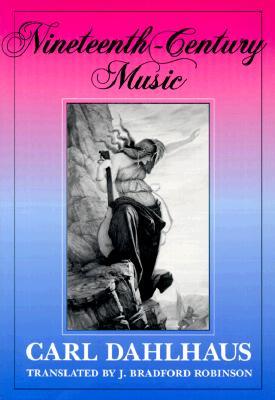Since 19th-century music is usually the music that we know best, and often like the best, and since too this volume appears to be printed as a textbook, we may have more than one reason for wanting to read a new book that could change the definition of its topic and our way of looking at it, and even the way the subject is taught.
The late Professor Dahlhaus taught in Berlin and had broad impact through his many writings. In Nineteenth Century Music: we can see both his erudition and his profoundly German nature; and these qualities themselves are extended to such a degree that we must also experience an ambivalence about them.
As for erudition, Dahlhaus makes the other histories of 19th-century music that I’ve seen pale by comparison; and that’s not so much a musical or technical matter as it is a cultural one. Dahlhaus isn’t after lists of works or dates or opus numbers or key signatures as he is firmly after the cultural and social and political context of Beethoven and Rossini, Wagner and Verdi, and the music of the period stretching from 1814 to 1914. For Dahlhaus, the history of music is-or should be nested in the context of social history.
I admire Dahlhaus’s willingness to sacrifice exhaustiveness in order to gain breadth. He’s willing to deal with a composer such as Chopin by synecdoche—we take the part for the whole. Chopin’s gone in not much more than one page; but Dahlhaus pauses to score points about the true meaning of “salon music” in a way that distinguishes his history from all others.
Dahlhaus’s history is modem and ironic, featuring citations of Theodor Adorno, Walter Benjamin, and Jurgen Habermas. His history is framed around the power struggle between classes, the revolutionary years of 1830 and 1848, and the development of bourgeois culture and institutions. His history is as much of the reception of 19th-century music as it is of the music itself; and it is also a history of our modern consciousness, of our needs in the late 20th century, as well. Dahlhaus’s history is as Hegelian (if not Marxist), as dialectical, as “Frankfurt school” as it can be. Yet we may find the besetting self-referentiality, the obsessive intellectualizing, and the compulsive contrariness to be, in spite of all brilliance, finally exasperating. Roman tic Europe was not, after all, a theme park devoted to confirming the theories of alienated intellectuals.
Professor Dahlhaus, at his best, has a way of putting things that’s illuminating, and he can extend a musical apercu to a political truth:
On the surface, [Rossini’s] switching of genres can look like a mindless confusion of styles. It becomes intelligible when, without undue psychologizing, we conceive of Rossini’s music as an expression of its moment in history, including the history of the human psyche. . . . In Rossini the extremes meet: the farcical takes on catastrophic proportions in the frenzy of the music; the tragic, in its moments of greatest despair, exposes the marionette strings from which the characters are dangling. For a skeptic like Rossini, whose cheerfulness is simply the obverse of a melancholy that afflicted not just himself but his entire age, these extremes prove to be complementary.
Dahlhaus’s observations on Moniuszko’s Halka seem also to show him at his best, as do his pages on “Choral Music as a Form of Education” and “Romanticism and Biedermeier Music.” There are, however, some problems to be found with those all-too-numerous passages in which Dahlhaus seems to be competing with a certain character once created by Sid Caesar, or with “Professor” Irwin Corey on one of his Teuto-academic rampages. The absurdity of dismissing objective reality because it doesn’t fit theory is displayed too often, and in a tortured language that continually crosses the threshold of parody.
Still, Carl Dahlhaus’s insistently revisionist Nineteenth-Century Music is no doubt a work which anyone interested in the subject should read—or should I say, confront-even if it calls for a few Alka-Seltzers along the way.
[Nineteenth-Century Music, by Carl Dahlhaus, Translated by J. Bradford Robinson (Berkeley and Los Angeles: University of California Press) 417 pp., $35.00]

Leave a Reply